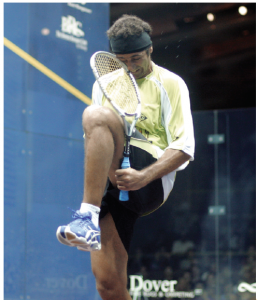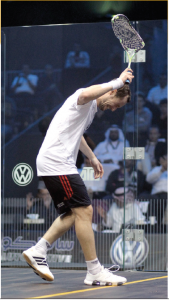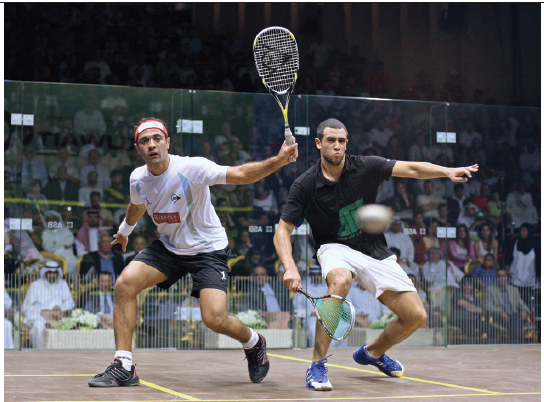By James Zug
Take yourself back to the 1961 National Singles. The men are playing at Penn. In the quarters Charlie Ufford faces his former Harvard classmate
Dave Watts. They are old friends and former teammates. They play together in New York. Ufford has almost always won—he played No. 1 and Watts No. 2 when they were at Harvard—and Watts has just one real win over Ufford, in the Met Open one year. Ufford is the three seed. He just beat future national champion Sam Howe. Over the years, Ufford will make fourteen quarters at the National Singles—no man in history has ever matched that record of consistent excellence.

Ufford wins the first and third games easily, loses the second and the fourth 15-12. In the fifth he jumps to a 14-6 lead. “The great smasher seemed to be on his way to a pounding, predictable defeat by Ufford,” wrote Bob Lehman in the Met SRA yearbook. Then Ufford starts to lose match points. “The first three match points, I was all relaxed,” Ufford told me when we talked last month. “Then the next three points, I worked like mad, hustling around the court, doing anything to win the point. After that, I was panicked.” Watts, the “altitudinous left-handed slugger,” as the US Squash yearbook wrote, “is crushing hard serves and hitting nicks at will. Ufford makes just one error—he isn’t choking at all—as Watts slams winner after winner.”
At 14-14, Ufford calls set-three. Watts snags the first point—nine in a row now. But Ufford rights the ship and captures the next two points of the tiebreaker when Watts tins. At 2-1, Ufford cannons a hard criss-cross serve, into the body. “Dave had this wild swing,” Ufford said, “and hit a flukey mishit, a reverse corner, for a winner.” Then another winner.
It is 2-2. Watts rifles a hard serve. “It came out off the back wall and was running along the side wall. I waited and waited and waited to hit it and finally I had to swing. I swung and missed.”
Watts wins. Ufford has squandered a total of ten match points.
Now, place yourself back at Ringe. Late Saturday afternoon.
The middle of February. That steeply rising, robin’s egg-blue concrete gallery. The hushed crowd, chilled by the lack of heat, squirms with the insidious mix of pleasure and horror at watching a player disintegrate before your eyes. Ufford can’t get a point to save his life; Watts is on fire.
After Ufford told me the story of 1961, I asked, “What did Watts say after the match?”
“Nothing.”
“What did you say?”
“Nothing. What’s there to say? It was terrible.”
In 1872 John Ringwood Atkins wrote The Book of Racquets. It was the first book on the game of racquets, the father of squash. On page forty-five, Atkins mentioned a racquets tradition: “When the game has scored the last ace but one, it is the rule to call ‘Game ball.'” Atkins also mentioned that at some courts, the marker would call out “Look sharp” when a player reached thirteen, ie., one point away from a game ball.
Handed down from father to son, racquets bequeathed squash the tradition of calling out “game ball” when a player reaches the precipice of the ultimate point of the game. And when a player has a match point, “game ball, match ball.” You even, rarely, hear “championship ball.”

Game ball has been a part of British squash since the 1920s when officials in London started to standardize the softball game. In 1926 Charles Arnold published one of the first books in Great Britain on squash, The Game of Squash Racquets. (Note the spelling of the word racquet that both Atkins and Arnold use; the cqu style was almost universal around the world until the British began using the ck style in the 1930s.) On the first page of the rules of the game at the back, Arnold stated: “Note—When ‘Hand in’ requires one more ace to win the game, the marker shall call his score ‘Game Ball.’”
As for the U.S., the idea of calling out game ball got lost in traveling across the North Atlantic, and there is no mention of such a tradition in any set of hardball squash rules.
Two simple words: game ball. But they mirror two other simple words: As if.
As if the players and the spectators don’t know. As if anyone except the absolute neophyte viewer doesn’t know it is a game or match or championship point.
Game ball is unnecessary, nonsen-sical and annoying .As Ufford said, what is there to say? Why say anything at all? Some people argue that it helps explain the situation to the gallery. Well, like every other sport, the crowd watching on their computer or mobile phone has the commentators explaining the action (“Well, PJ, he’s got five game balls in hand now….”) and the crowd at the event, almost all of them know what the score means.
It reminds me of that classic person you have met, usually on a guided tour or cruise or otherwise enclosed space: He Who Says States The Obvious. Sports don’t invite such a dreadful bore to the party. They don’t tell the players: “you are on your deathbed” or “you are on the verge of victory and don’t choke.”
Only racquets still does it. But racquets, we have to forgive. It is such a dangerous game that the marker is required to say “play” after every stroke to tell the players that it is safe to continue the rally. And besides, they’ve been calling game ball in racquets for at least two hundred years.
No other racquet sport does it: badminton, table-tennis, racquetball, platform tennis. Nothing.
Hockey has the public-address announced final minute of the period and football has the two-minute warning. But those are related to time, not the score. Television broadcasters of tennis have developed the pesky break-point terminology, but that is John McEnroe yakking in the booth; the live audience and the players, riven with the tension of the moment, are not subjected to the indignity of hearing some officious spoilsport declare to the world after you’ve dumped the ball into the net at thirty-love, “Love-forty. That mean’s you’ve got three game points to save, buddy, or you’re on the fast train to Gonesville.”
Since the transition to softball in the early 1990s, we have seen a slow creeping in of British jargon and the slow exit of American phrases. That is to be expected—that is how languages evolve. Game ball is now common and accepted.
It has even crept into proper hardball doubles. No one for the first century of doubles said “game ball,” but in the past few years you now hear it. Even the old stalwart referees like Larry Sconzo and Mike McGorry have been heard to utter it now, something they never would have dreamed of twenty years ago. There is nothing in the rules of hardball doubles about game ball, but referees still often say it.

Many overseas coaches like the way saving or blowing match balls helps their players develop mental toughness. “If you have match ball, it tends to make you focus a little more, especially if you have lost matches from that position,” said David Pearson, the famed British coach. “The hurt is too much so you do not want that feeling again. It can also make you casual in your approach if, say, you have six match balls, letting cheap points go. When you are behind, people with guts and a will to win actually play better—like Nick Matthew, Laura Massaro, Nicol David, Ramy Ashour. Also, they hate losing and like the feeling of winning. I think the word game or match ball gives the player a mental stimulation to react to how important the next rally is.”
Malcolm Willstrop, another top British coach, also likes game ball: “I think it is a worthwhile concept, and because it’s not common practice elsewhere doesn’t mean it’s wrong. I suppose it puts emphasis on the significance of the next point, which is no bad thing for the players if they can deal with the pressure and heightens the moment for spectators.”
But you don’t need the emphasis. It makes the match ball less exciting, not more.
If you had game ball way back when, you would probably not have had perhaps the most legendary match in U.S. squash history. In the early 1930s, Bill Howe saved fourteen match points at the National Singles. He was playing for Boston in the five-man team event. After going down 2-0, 14-0 to Squab Kennedy of Philadelphia, Howe suddenly revived. The story goes that Lothrop Withington, a Boston teammate, falsely told Howe at fourteen-love that Boston needed his match to win their contest with Philadelphia. Somehow Howe managed to crawl back, saved those fourteen match points and won in five.
The story has an element of the apocryphal, even though the very dependable Harold Kaese wrote about it in the Boston Globe in 1949. For one, Betty Howe Constable, Bill’s daughter and five-time national champion, didn’t recall the incident. Still, imagine the broken-record if the referee had been He Who States the Obvious and had said game ball thirteen straight times in that pivotal third game.
Like in most places of intimate interaction, whether in the bedroom or in the squash court, there are some things better left unsaid.





